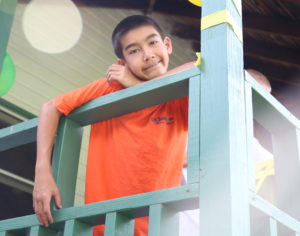One of the most routine questions we address as the directors of Summit is whether it is a good ‘match’ for a prospective camper, traveler, or weekender. Since the application process is an investment in time, we certainly want our parents and the prospective participant to feel secure in this area even before those initial steps begin. Thus, we will happily meet with, talk to, skype with, and answer as many questions as are needed to do our best in this area. We know that ultimately, the programs must match the child or teen’s needs in order for both sides to have the positive outcome that everyone is looking for (and for our campers, that they truly need).

Yet, while it is the most routine of questions that we address– it is true that there is no simple answer to whether a child or teen is a good ‘fit’ for Summit. Historically, Summit serves kids that have diagnoses such as ADHD/ADD, Learning Differences, and/or Asperger’s Disorder/HFA. However, not all youth that have such a diagnosis might benefit from Summit’s programs, nor are our programs limited to benefiting youth with any specific diagnosis. Summit has also been a good fit for youth that have mild tourette’s disorder, PDD-NOS, acquired TBI, and many other unique needs. This is because the underlying common factor in the campers and travelers who benefit from Summit’s environment is not about addressing a certain symptom or outcome of any diagnosis. Rather, Summit is a community environment for any and all children and teens that have been unable or would be unable to find social success of equality in a neurotypical community despite a cognitive and emotional desire to find that success.
Here are some commonalities that we generally see in our campers, travelers, and weekender participants.
He/she comes from a setting (home, school, community) supported by adults whose intent is to provide the best possible outcomes for that child within his/her capability. Often, this place offers clear expectations and regular routine.
He/she is in an inclusive setting for learning such as a traditional classroom where he/she is able to perform academically with or without modifications, but still struggles to fit in socially.
He/she is in a specialized educational setting for learning such as an approved out of district placement, private school, or contained/resource setting where he/she receives support in all areas and has social success there due to the specialized nature of that program. Often, our he/she has an IEP or 504 plan.
He/she has significant challenges with learning or executive function that are carefully supported in the school setting, making it unrealistic to expect getting the most out of another independent setting where there are very few adults (counselors) that have an understanding of how to support such needs.
He/she has had limited social success in a neurotypical recreational setting due to the demands of such a setting and has not able to establish relationships of peer equality in such a setting, even when the adults in the program could meet his/her needs.
He/she has skills for basic social interaction, and generally, can connect initially with his/her peers.
Sometimes, because he/she is overtly gregarious; verbally calls out to and engages peers, attempts to establish friendships, and initiates peer interactions but lacks maturity, social awareness, or same age interest that can maintain those friendships on a level of equality; these initial connections fall apart.
Sometimes, because he/she is socially anxious, and actively avoids social situations, is unusually quiet around peers or in public settings compared to a comfortable setting, finds it easier to connect with others online/remotely, or has a limited but intense area of interest or interests that are shared by any connections the child does make, it is very difficult to find peers to really connect with on a deeper level.
Sometimes, because he/she is easily frustrated or intolerant; despite liking to be in the community and engage with same age peers, he/she is easily triggered by having to compromise, share, or cope with peers’ actions, can become too competitive, and has a tendency to over personalize and exaggerate ‘infractions’, and thus has a tendency to alienate potential friendships.
Sometimes, he/she is keenly aware of his/her differences and thus too self conscious to establish peer relationships. He/she may have experienced peer and/or adult bullying related to their social challenges, been rejected from or had a negative experience in a traditional program, or has experienced an unequal experience of relationship (has been taken advantage of in the past).
Lastly, we often see that he/she is falling into a “gray area”, where the development of his/her personal and interpersonal skills are not significantly behind peers of the same age group– but yet significant enough that they are preventing success in establishing more meaningful or accepting relationships in the average social setting. This is the most common experience of the Summit camper. He/she risks becoming an outsider, or someone who is just ‘along for the ride’- an experience which can be defeating and harmful to the his/her self esteem precisely due to awareness of such rejection.
Certainly, the primary goal of our programs is to create a community for our participants that is one where they are fully accepted- and find friendships of true equality, mutual interest, and social belonging.